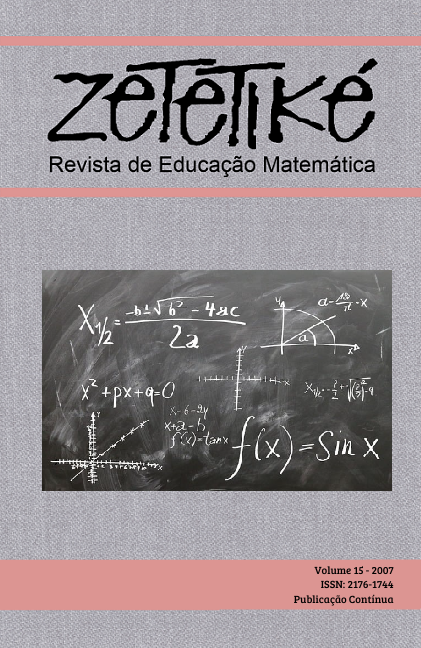Abstract
This research has the objective of understanding how students’
participation takes place within an environment where get involved with their
own reality problems, plan and collect related information, build models, make
forecasts and validate the models built. This pedagogical strategy, named
Mathematical Modeling (BASSANEZI, 2002), has been widely used within
classrooms, mainly on works by Biembengut, 1997; Borba, Meneghetti and
Hermini, 1999; De Corte and Verschaffel, 1997, among others, with meaningful
results. However, when reviewing the bibliography, we have not found works
from such perspective at Mathematical Modelling and that tried to understand
which social and pedagogical element were present, when the process actors -
students and teachers - act within such environment. Such situation, then,
became our questioning on the development of this work, which followed the
path of qualitative approach, with the Elementary School students from a
Public School. The pedagogical action involved subjects such as Water,
Garbage, Electrical Power and Deforestation, with the construction of some
models, such as, population growth forecast and water consumption.
Environmental subjects allowed students to discern a field that’s rich in
applications, allowing the integration of the students experience with
mathematics, allowing and encouraging them to question, to make decision
and, at the same time, to become aware of some of the environment problems
closer to their day to day
References
BASSANEZI, R. C. Modelagem Matemática. Dynamics, Blumenau, v. 2, n. 7, p. 55-83, abril/jun, 1994.
BASSANEZI, R. C. Ensino-aprendizagem com Modelagem Matemática: uma nova estratégia. São Paulo: Contexto, 2002. 389 p.
BLUM, W.; NISS, M. Aplied mathematical problem solving, modelling, applications, and links to other subjects - state, trends and issues in mathematics instruction. Educational Studies in Mathematics, Dordrecht, v. 22, n. 1, p. 37-68. 1991.
BIEMBENGUT, M. S. Qualidade no ensino de Matemática na engenharia: uma proposta metodológica e curricular. 1997. 305 f. Tese (Doutorado) - Curso de Engenharia de Produção e Sistemas, Universidade Federal de Santa Catarina, Florianópolis, 1997.
BOGDAN, R. C.; BIKLEN, S. K. Investigação qualitativa em Educação Matemática: uma introdução à teoria e aos métodos. Tradução M. J. Alvarez , S. B. Santos e T. M. Baptista. Porto: Porto Editora, 1994. 336 p.
BORBA, M. C.; MENEGHETTI, R. C. G.; HERMINI, H. A. Estabelecendo critérios para avaliação do uso de Modelagem em sala de aula: estudo de um caso em um curso de Ciências Biológicas. In: BORBA, M. C. Calculadoras gráficas e Educação Matemática. Rio de Janeiro: Art Bureau, 1999. p. 95-113.
CALDEIRA, A. D.; MEYER, J. F. C. A. Educação matemática e ambiental: uma proposta de formação continuada - e de mudanças, Zetetiké, Campinas, v. 9, n. 15/16, p. 155-170, 2001.
CANDAU, V. M. Reinventar a escola. 2ª edição. Petrópolis: Vozes. 2000. 259 p.
D’AMBRÓSIO, U. Da realidade à ação: reflexões sobre educação e matemática. 2ª edição. São Paulo: Summus; Campinas: UNICAMP, 1986. 115 p.
DE CORTE, E.; VERSCHAFFEL, L. Teaching realistic mathematical modeling in the elementary school: A teaching experiment with fifth graders. Journal for research in mathematics education, vol. 28, n. 5, p. 577-601. 1997.
FERREIRA, D. H. L. O tratamento de questões ambientais: um trabalho com alunos do Ensino Fundamental e Médio. 2003. 278 f. Tese - Instituto de Geociências e Ciências Exatas, Universidade Estadual Paulista, Rio Claro, 2003.
HURT, P. D. Science education for the 21st Century. School Science and Mathematics, v. 100, n. 6, p. 282-287, out/2000.
MILES, M. B.; HUBERMAN, A. N. Qualitative data analysis: an expanded sourcebook. 2nd ed. Thousand Oaks: Sage, 1994. 338 p.
SKOVSMOSE, O. Reflective knowledge: its relation to the mathematical modelling process. Int. J. Math. Educ. Science Technol., London, v. 21, n. 5, p. 765-779, 1990.
SKOVSMOSE, O. Aporism and Critical Mathematics Education. For the Learning of Mathematics, Kingston, v. 20, n. 1, p. 2-8, mar. 2000.
SKOVSMOSE, O. Educação Matemática crítica. Campinas: Papirus, 2001. 160 p.
STEFFE, L. P.; THOMPSON, P. W. Teaching experiment methodology: Underlying Principles and Essential Elements. In LESH, R.; KELLY, A. E. (Ed.). Research design in mathematics and science education. Hillsdate, NJ: Erlbaum, 2000. p. 267-309.

This work is licensed under a Creative Commons Attribution-NonCommercial-NoDerivatives 4.0 International License.
Copyright (c) 2014 Zetetiké: Revista de Educação Matemática

